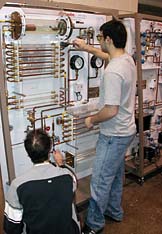With diploma in hand and armed with the confidence and knowledge that a good vo-tech program can instill, today's graduate often asks, "When can I start making the big bucks?" Of course, there is no pat answer to this question. But a prosperous career, like a good building, is built upon a solid foundation. Today we will examine some fundamental building blocks for the budding professional.

The Pillars
Most technical work in our field centers on these main themes:It is essential that today's graduate takes the theories learned on these subjects and fine-tunes them in the field. Manufacturer operation and maintenance guides are an excellent resource for additional information.
Electricity - Know what specific voltages and amperages should be and where to measure them in circuits. Know how temperature and the elements affect electrical circuits and components. Learn the 24-volt circuit inside and out.
Refrigeration - Know what refrigerant temperatures and pressures are supposed to be in the refrigerant circuit of the equipment you are repairing. Know where vapor and liquid are supposed to be in the system. Learn how to measure subcooling and superheat and apply the readings.
Combustion - Know the correct amount of oxygen, fuel, and heat the equipment you are working on uses, along with the proper sequence of spark, flame, burner, and safety operation. Know how the byproducts of combustion are dispelled.
Heat transfer - Know how to measure, read, and interpret the transfer of heat to cold in all mediums.
Fluid flow - Know the effects of temperatures and pressures on water, refrigerant, and air. Understand the relationship between how fluid is moved and the rate at which it is moved.
Preventive Maintenance
In order to check the operation of equipment, you must first know how it is supposed to run - the sequence of operation. While performing preventive maintenance, you will also learn how detrimental dirt can be to equipment and the importance of keeping it clean.Mentors
A mentor is someone who has been there and done it and is willing to take the time to help guide you along. A mentor can give you advice on performing service and dealing with customers, telling you what has worked and has not worked along the way. To make your relationship with your mentor fruitful, show respect for where they've been and ask plenty of questions.Network
Mix and mingle with other techs, manufacturers' service personnel, and your local wholesalers. Keep an address book or use a software program, such as Microsoft Outlook, to keep track of your contacts. Join trade associations, such as the Refrigeration Service Engineers Society (www.rses.org).Tools And Meters
Spend your first few years accumulating every tool and meter that you can afford. Check to see what kind of gear that more experienced technicians are using. Make it your quest to be the technician in your company that has every tool and meter needed to do the job. Take care of your tools and meters. Keep them in orderly fashion on your truck. Calibrate when necessary and always keep extra batteries on hand.Computers And The Internet
Learn how to use computers. From diagnostic equipment to company operating systems to educational tools, computers are an everyday fact of life in our profession. There are many fine resources available for technicians on the Internet. In addition to www.rses.org, www.achrnews.com, www.hvacchannel.tv, www.heatinghelp.com, www.ncinstitute.com, and www.tecdaddy.com are other examples.Give Yourself An Edge
Advancing your career is all about adding value. The more value you add to a situation, the more valuable you are. Give yourself an edge. Become the "go-to person" in your company for a particular subject. Learn and become better than anyone else on boilers, heat pumps, and airflow diagnostics.David E. Rothacker is a member of the National Comfort Institute's Advisory Board and a National Comfort Team Founding Member. For questions or comments on Tech Basics, contact Rothacker at ewizaard@hotmail.com.
Publication date: 04/26/2004
